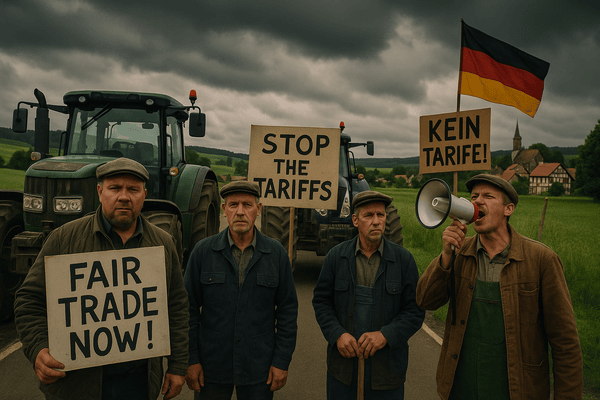BERLIN, April 17, 2025 — Across Germany, from the rolling fields of Bavaria to the northern plains of Lower Saxony, an unexpected storm is hitting the streets instead of the skies. Thousands of German farmers have launched what has become one of the country’s largest and most emotionally charged protests in recent memory.
Their message is loud and clear: “Enough is enough.”
The German farmers protest 2025 began as a response to sweeping green reforms proposed by the federal government. But behind the banners and blockades lies a deeper frustration—a feeling of being cornered by both domestic policy and international pressure. First, it was the tariff war. Now, it’s environmental regulation.
A System Under Strain: What Sparked the Uprising
The immediate trigger came in early 2025 when the German government, under Chancellor Olaf Scholz, announced a phase-out of diesel fuel subsidies for agricultural vehicles. In addition, new environmental guidelines would impose tighter restrictions on fertilizer usage, crop rotation requirements, and land preservation rules.
While Berlin has framed the move as a necessary shift toward sustainability and compliance with EU climate targets, farmers say the burden is being unfairly placed on their shoulders.
“We’re being sacrificed for climate headlines,” said Johann Meier, a farmer from Baden-Württemberg. “These policies might look good on paper, but in reality, they’re crushing small farms like mine.”
The cost of operating agricultural machinery without diesel subsidies has already surged. Coupled with increasing regulation and market volatility, many farmers say their profit margins have evaporated.
Government Reaction: Reassurance or Political Spin?
Faced with mounting pressure and nationwide protests, Chancellor Scholz attempted to calm tensions this week, stating:
“We hear the voices of our farmers. Climate responsibility and rural stability must go hand in hand. We are working on a fair transition.”
Finance Minister Christian Lindner also proposed a transition fund of €1.2 billion to support farms adapting to the new regulations. He called for a “step-by-step approach” to subsidy reductions rather than an abrupt cut.
But to many rural communities, the response felt hollow.
Klara Jung, spokesperson for the German Farmers’ Association (DBV), said in a televised interview:
“Our livelihoods are on the line. Promises of transition mean nothing when bills are due and fields are empty.”
As a show of continued defiance, protest organizers have planned further demonstrations, including a coordinated tractor blockade around key Bundestag offices in Berlin.
🇺🇸 Remember the Tariffs? U.S. Pressure Still Lingers
This isn’t the first blow Germany’s agricultural sector has taken in recent months. Early in 2025, newly re-elected U.S. President Donald Trump reinstated steep tariffs on several EU agricultural exports, including German dairy, pork, and grain products.
The move was framed by Washington as a measure to protect American farmers, but it sent shockwaves across Europe’s agricultural economies—Germany included.
Friedrich Lehmann, a grain exporter in Lower Saxony, explains:
“We lost a huge market overnight. First the tariffs, then fuel costs, now environmental taxes? It feels like we’re being punished for feeding people.”
The double-hit — international tariffs and local restrictions — has intensified farmers’ belief that they’re becoming scapegoats in political games beyond their control.
Public Support and Growing Unrest
Despite the traffic disruptions and city center blockades caused by the protests, public sentiment hasn’t turned against the farmers. In fact, many Germans have expressed understanding, if not outright support.
“I’m annoyed I couldn’t get to work on time, sure,” said Lisa Krämer, a Berlin resident. “But I’d be more worried if farmers stopped working entirely.”
Social media platforms have exploded with footage of tractors rolling into cities under police escort, drawing millions of views. The hashtags #NoFarmersNoFood, #TractorProtests, and #GermanyProtests continue trending across Twitter and TikTok.
What Comes Next? The Pressure Builds
The Farmers’ Association has called for nationwide solidarity actions in the coming weeks, urging consumers and local businesses to back their cause. Talks between the DBV and the federal government are reportedly underway, though no binding compromises have been reached.
Meanwhile, political opposition parties, especially the Christian Democratic Union (CDU), are seizing the opportunity. CDU leaders have criticized Scholz’s government for being “out of touch with rural realities,” and hinted at rolling back green reforms if elected.
EU policymakers, too, are watching with caution. Germany is a cornerstone of European food production. What happens here could shape the future of agricultural policy across the bloc.
Bottom Line: More Than Just a Protest
The German farmers protest 2025 isn’t just about fuel, fertilizers, or even climate. It’s about recognition. It’s about a way of life under threat from both global economic decisions and domestic political agendas.
In a world rushing toward sustainability, the challenge is clear: how to build a greener future without leaving behind the very people who cultivate it.
The German farmers protest 2025 erupts nationwide over subsidy cuts and green policies, following U.S. tariffs. Read why farmers are saying “enough is enough.”



Leave a Reply